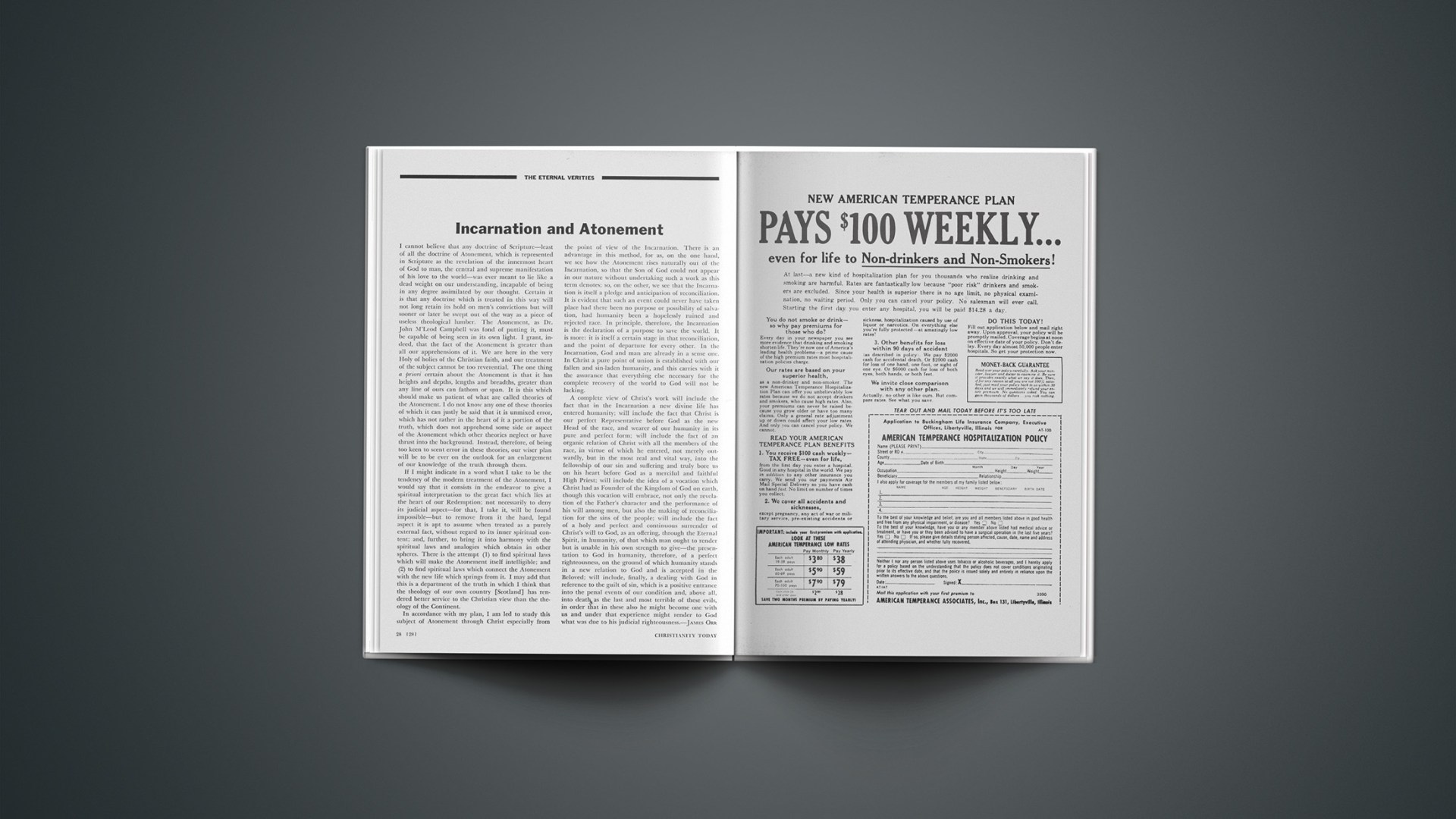I cannot believe that any doctrine of Scripture—least of all the doctrine of Atonement, which is represented in Scripture as the revelation of the innermost heart of God to man, the central and supreme manifestation of his love to the world—was ever meant to lie like a dead weight on our understanding, incapable of being in any degree assimilated by our thought. Certain it is that any doctrine which is treated in this way will not long retain its hold on men’s convictions but will sooner or later be swept out of the way as a piece of useless theological lumber. The Atonement, as Dr. John M’Leod Campbell was fond of putting it, must be capable of being seen in its own light. I grant, indeed, that the fact of the Atonement is greater than all our apprehensions of it. We are here in the very Holy of holies of the Christian faith, and our treatment of the subject cannot be too reverential. The one thing a priori certain about the Atonement is that it has heights and depths, lengths and breadths, greater than any line of ours can fathom or span. It is this which should make us patient of what are called theories of the Atonement. I do not know any one of these theories of which it can justly be said that it is unmixed error, which has not rather in the heart of it a portion of the truth, which does not apprehend some side or aspect of the Atonement which other theories neglect or have thrust into the background. Instead, therefore, of being too keen to scent error in these theories, our wiser plan will be to be ever on the outlook for an enlargement of our knowledge of the truth through them.
If I might indicate in a word what I take to be the tendency of the modern treatment of the Atonement, I would say that it consists in the endeavor to give a spiritual interpretation to the great fact which lies at the heart of our Redemption; not necessarily to deny its judicial aspect—for that, I take it, will be found impossible—but to remove from it the hard, legal aspect it is apt to assume when treated as a purely external fact, without regard to its inner spiritual content; and, further, to bring it into harmony with the spiritual laws and analogies which obtain in other spheres. There is the attempt (1) to find spiritual laws which will make the Atonement itself intelligible; and (2) to find spiritual laws which connect the Atonement with the new life which springs from it. I may add that this is a department of the truth in which I think that the theology of our own country [Scotland] has rendered better service to the Christian view than the theology of the Continent.
In accordance with my plan, I am led to study this subject of Atonement through Christ especially from the point of view of the Incarnation. There is an advantage in this method, for as, on the one hand, we see how the Atonement rises naturally out of the Incarnation, so that the Son of God could not appear in our nature without undertaking such a work as this term denotes; so, on the other, we see that the Incarnation is itself a pledge and anticipation of reconciliation. It is evident that such an event could never have taken place had there been no purpose or possibility of salvation, had humanity been a hopelessly ruined and rejected race. In principle, therefore, the Incarnation is the declaration of a purpose to save the world. It is more: it is itself a certain stage in that reconciliation, and the point of departure for every other. In the Incarnation, God and man are already in a sense one. In Christ a pure point of union is established with our fallen and sin-laden humanity, and this carries with it the assurance that everything else necessary for the complete recovery of the world to God will not be lacking.
A complete view of Christ’s work will include the fact that in the Incarnation a new divine life has entered humanity; will include the fact that Christ is our perfect Representative before God as the new Head of the race, and wearer of our humanity in its pure and perfect form; will include the fact of an organic relation of Christ with all the members of the race, in virtue of which he entered, not merely outwardly, but in the most real and vital way, into the fellowship of our sin and suffering and truly bore us on his heart before God as a merciful and faithful High Priest; will include the idea of a vocation which Christ had as Founder of the Kingdom of God on earth, though this vocation will embrace, not only the revelation of the Father’s character and the performance of his will among men, but also the making of reconciliation for the sins of the people; will include the fact of a holy and perfect and continuous surrender of Christ’s will to God, as an offering, through the Eternal Spirit, in humanity, of that which man ought to render but is unable in his own strength to give—the presentation to God in humanity, therefore, of a perfect righteousness, on the ground of which humanity stands in a new relation to God and is accepted in the Beloved; will include, finally, a dealing with God in reference to the guilt of sin, which is a positive entrance into the penal events of our condition and, above all, into death as the last and most terrible of these evils, in order that in these also he might become one with us and under that experience might render to God what was due to his judicial righteousness.—









